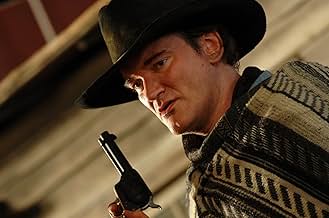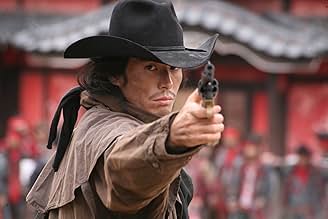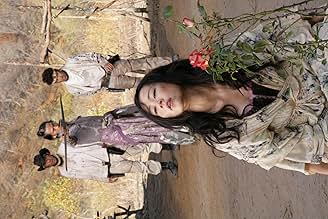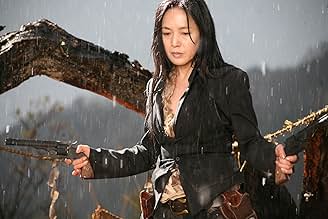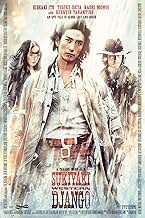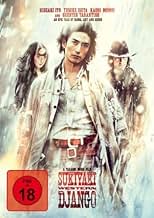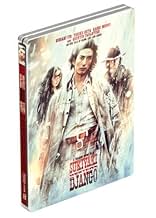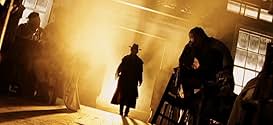IMDb RATING
6.1/10
16K
YOUR RATING
A nameless gunfighter arrives in a town ripped apart by rival gangs and, though courted by both to join, chooses his own path.A nameless gunfighter arrives in a town ripped apart by rival gangs and, though courted by both to join, chooses his own path.A nameless gunfighter arrives in a town ripped apart by rival gangs and, though courted by both to join, chooses his own path.
- Awards
- 4 wins & 5 nominations total
- Director
- Writers
- All cast & crew
- Production, box office & more at IMDbPro
6.116.2K
1
2
3
4
5
6
7
8
9
10
Featured reviews
Spaghetti western homage that offers nothing new
This Japanese-Italian crossover is a homage to the great spaghetti westerns of the 1960's and 70's. The oh-so familiar plot is reminiscent of Akira Kurosawa's masterpiece Yojimbo, later remade by Sergio Leone as a western with A Fistful Of Dollars. A brooding gunslinger arrives in a small town that has been torn apart and occupied by two warring clans - the reds and the whites. After advertising his expert gun skills up his arrival, he at first offers up his services to the highest bidder, but after realising the peril faced by the town's innocent natives, he decides that he can put his skills to better use and wage a war against the clans. All of this is seemingly told by a mysterious stranger played by Quentin Tarantino, who introduces the film at the beginning.
After the truly cringe-worthy opening scene, in which the aforementioned Tarantino shows off his acting 'skills' and mows down a few faceless bad guys and talks tough, the film seems to pick up some pace. The opening is deliberately designed to look cartoonish, with plastic looking sets and over-the-top blood spraying. It just doesn't work and thankfully moves away from this style and takes on a more traditional method. For all it's trying, the film never leaves second gear. The familiar storyline doesn't offer anything I've not seen before, and the decision to have the Japanese actors speak in broken English with subtitles is an interesting idea I suppose, but just becomes slightly annoying and confusing. I would expect better from a director such as Takashi Miike, who made the excellent Audition and Ichi The Killer. I just pray he doesn't become another homage-loving filmmaker like Tarantino.
www.the-wrath-of-blog.blogspot.com
After the truly cringe-worthy opening scene, in which the aforementioned Tarantino shows off his acting 'skills' and mows down a few faceless bad guys and talks tough, the film seems to pick up some pace. The opening is deliberately designed to look cartoonish, with plastic looking sets and over-the-top blood spraying. It just doesn't work and thankfully moves away from this style and takes on a more traditional method. For all it's trying, the film never leaves second gear. The familiar storyline doesn't offer anything I've not seen before, and the decision to have the Japanese actors speak in broken English with subtitles is an interesting idea I suppose, but just becomes slightly annoying and confusing. I would expect better from a director such as Takashi Miike, who made the excellent Audition and Ichi The Killer. I just pray he doesn't become another homage-loving filmmaker like Tarantino.
www.the-wrath-of-blog.blogspot.com
An Unworthy Opponent
Sometimes a film presents itself to you as a character, whole in definition, with whom you have to deal. This is possible either because the film has a soul that the artist has created, or because the filmmaker borrows one by hijacking a genre. That is what Miike has done here. Though some of his other experiments sit well with me, this does not.
Dealing with such a character is not a simple emotional (and sometimes intellectual) transaction. Sometimes it is a struggle, a contest where each party wants to pull the other into their own world. Even these than be worthwhile, but the chances go way down; motives get questioned, selves get examined when you have to struggle.
I saw this together with 'Rango.' Same strategy, and even many of the same references. But as thin as Rango was, it presented a worthy character. Whether you choose to argue or even try to win is up to you. But at least you should choose your encounters wisely.
Ted's Evaluation -- 1 of 3: You can find something better to do with this part of your life.
Dealing with such a character is not a simple emotional (and sometimes intellectual) transaction. Sometimes it is a struggle, a contest where each party wants to pull the other into their own world. Even these than be worthwhile, but the chances go way down; motives get questioned, selves get examined when you have to struggle.
I saw this together with 'Rango.' Same strategy, and even many of the same references. But as thin as Rango was, it presented a worthy character. Whether you choose to argue or even try to win is up to you. But at least you should choose your encounters wisely.
Ted's Evaluation -- 1 of 3: You can find something better to do with this part of your life.
A fistful of ramen - an interesting but not entirely successful east-meets-west experiment
Although it has the deceptive appearance of one and has been championed as such by many reviewers, Sukiyaki is not quite as much a spaghetti western love letter like, say, Alex De La Iglesias' 800 BALAS as it is a typically Miike-ian reinterpretation of the genre that borrows from both chambara and spaghetti western yet subscribes to neither. It's much less a remake or reimagining of Sergio Corbucci's original DJANGO, not a prequel, sequel or in any other way narratively connected to the original or the gazillion unofficial cash-ins small-time Italian producers with dollar signs gleaming in their eyes feverishly churned out in its wake.
What first screams for our attention is the kind of east-meets-west melting pot Miike has prepared for our enjoyment. A signpost on the lone gunman's way reads 'Nevada', the actors speak English with heavy and grating Japanese accents, some of them bear katanas and most others six shooters, the shabby ghost town the movie takes place in is distinctly Japanese in its architecture yet ornamented with dead men hanging from the town gate in typical 'far west' fashion, there's a sheriff, short blurbs about samurais, rumors of hidden treasure and a gold rush explained in a flashback.
However Miike is not attempting what many other directors have tried to in the past, that is to transpose occidental concepts, their mentality or filmic tradition to the oriental or the other way around. This is no RED SUN, EAST MEETS WEST, THE MASTER GUNFIGHTER or A FISTFUL OF DOLLARS to name but a few. What he tries and largely succeeds in creating is this alternative 'far west', a grotesque, exaggerated caricature of the American frontier myth seen through Japanese eyes.
A seamless melding of western and chambara that takes place in a distinctly imagined location. In Miike's vision of the genre west, the (historical naval) battle of Dannoura between the Genji and the Heike takes place close to Quentin Tarantino dressed in a poncho playing a gunfighter called Ringo and is followed a couple hundred years later by a signpost that reads Nevada and the Genji and Heike still split into warring factions. If a country had to be named as the setting for Sukiyaki it would be the United States of Nippon in Sukiyaki's universe, there never was any Japan or America to begin with. A sort of RETCON or 'Retroactive Continuity' as it is known is taking place here. Fans of comic books will be familiar with the myth-making idea here.
It's a damn shame then that a movie as conceptually and aesthetically ambitious as Sukiyaki is let down by a terrible script, Miike's ill-advised decision to have all his actors mumble their way through their lines in distracting Engrish and the pace-clogging inclusion of at least thirty minutes of dead running time that should have been mercifully left to die at the cutting room floor.
There are scenes that don't work at all (such as the unnecessary dance scene) and there are scenes that outstay their welcome by a good number of minutes. And they're all strung together in a painfully mediocre pastiche of a script carrying with it a confused and incongruous mood that can't decide whether it wants to be taken serious, laughed at or laughed with. Quasi-philosophical blurbs are married with ill-advised slapstick nonsense, fortune cookie nuggets of wisdom with lame flashbacks and cartoon-esquire action. There's something for everyone here and everything pushing in different directions at once. On one hand Miike seems to go for an air of sentimental and meaningful profundity while at the same time indulging his nuttier side.
The good in Sukiyaki come in the form of a commendable visual attention to detail and beautiful lighting, the blistering action and the comic book vibe he goes for that recalls the days of FUDOH and DEAD OR ALIVE. While not without the macabre touches we've come to expect from him, Sukiyaki is a decidedly commercial action picture, one that will ironically appeal more to Tarantino and Rodriguez fans than devoted spaghetti western or chambara afficionados.
Perhaps emphasizing that last part, Tarantino has a short role as gunfighter extraordinaire Ringo. In the opening scene that supposedly takes place concomitant with the Battle of Dannoura he whacks pistolero-style three badly dressed goons and mouths off a couple of one-liners.
The scene is amusing at best but he has the show stole from right under his nose by the beautiful and intriguing set design and painted backdrops that recreate an oddly poetic and intentionally artificial rendition of the old west, perhaps recalling the dream sequence Akira Kurosawa created for Tatsuya Nakadai to stagger his way through in KAGEMUSHA or the similarly evocative painted sunsets of DODESUKADEN. I wish Miike had returned to that technique again later in the movie. Instead he uses a short anime passage that recalls KILL BILL. The final showdown in the snow is among the highlights of the movie and so is the appearance of a certain coffin and its contents that will have DJANGO fans nodding in approval.
What first screams for our attention is the kind of east-meets-west melting pot Miike has prepared for our enjoyment. A signpost on the lone gunman's way reads 'Nevada', the actors speak English with heavy and grating Japanese accents, some of them bear katanas and most others six shooters, the shabby ghost town the movie takes place in is distinctly Japanese in its architecture yet ornamented with dead men hanging from the town gate in typical 'far west' fashion, there's a sheriff, short blurbs about samurais, rumors of hidden treasure and a gold rush explained in a flashback.
However Miike is not attempting what many other directors have tried to in the past, that is to transpose occidental concepts, their mentality or filmic tradition to the oriental or the other way around. This is no RED SUN, EAST MEETS WEST, THE MASTER GUNFIGHTER or A FISTFUL OF DOLLARS to name but a few. What he tries and largely succeeds in creating is this alternative 'far west', a grotesque, exaggerated caricature of the American frontier myth seen through Japanese eyes.
A seamless melding of western and chambara that takes place in a distinctly imagined location. In Miike's vision of the genre west, the (historical naval) battle of Dannoura between the Genji and the Heike takes place close to Quentin Tarantino dressed in a poncho playing a gunfighter called Ringo and is followed a couple hundred years later by a signpost that reads Nevada and the Genji and Heike still split into warring factions. If a country had to be named as the setting for Sukiyaki it would be the United States of Nippon in Sukiyaki's universe, there never was any Japan or America to begin with. A sort of RETCON or 'Retroactive Continuity' as it is known is taking place here. Fans of comic books will be familiar with the myth-making idea here.
It's a damn shame then that a movie as conceptually and aesthetically ambitious as Sukiyaki is let down by a terrible script, Miike's ill-advised decision to have all his actors mumble their way through their lines in distracting Engrish and the pace-clogging inclusion of at least thirty minutes of dead running time that should have been mercifully left to die at the cutting room floor.
There are scenes that don't work at all (such as the unnecessary dance scene) and there are scenes that outstay their welcome by a good number of minutes. And they're all strung together in a painfully mediocre pastiche of a script carrying with it a confused and incongruous mood that can't decide whether it wants to be taken serious, laughed at or laughed with. Quasi-philosophical blurbs are married with ill-advised slapstick nonsense, fortune cookie nuggets of wisdom with lame flashbacks and cartoon-esquire action. There's something for everyone here and everything pushing in different directions at once. On one hand Miike seems to go for an air of sentimental and meaningful profundity while at the same time indulging his nuttier side.
The good in Sukiyaki come in the form of a commendable visual attention to detail and beautiful lighting, the blistering action and the comic book vibe he goes for that recalls the days of FUDOH and DEAD OR ALIVE. While not without the macabre touches we've come to expect from him, Sukiyaki is a decidedly commercial action picture, one that will ironically appeal more to Tarantino and Rodriguez fans than devoted spaghetti western or chambara afficionados.
Perhaps emphasizing that last part, Tarantino has a short role as gunfighter extraordinaire Ringo. In the opening scene that supposedly takes place concomitant with the Battle of Dannoura he whacks pistolero-style three badly dressed goons and mouths off a couple of one-liners.
The scene is amusing at best but he has the show stole from right under his nose by the beautiful and intriguing set design and painted backdrops that recreate an oddly poetic and intentionally artificial rendition of the old west, perhaps recalling the dream sequence Akira Kurosawa created for Tatsuya Nakadai to stagger his way through in KAGEMUSHA or the similarly evocative painted sunsets of DODESUKADEN. I wish Miike had returned to that technique again later in the movie. Instead he uses a short anime passage that recalls KILL BILL. The final showdown in the snow is among the highlights of the movie and so is the appearance of a certain coffin and its contents that will have DJANGO fans nodding in approval.
Well, It's Fresh
Sukiyaki Western Django (2007)
** (out of 4)
Quentin Tarantino in a Takashi Miike homage to Spaghetti Westerns is going to be enough to get a few curious people to watch but I must rip off a few reviews I've read, which called this film different but not very entertaining. In what's basically a remake of Akira Kurosawa's Yojimbo, a mysterious gunfighter (Ito Hideaki) with no name shows up and plays two rival gangs against one another. If someone was to call this the greatest movie ever made I honestly wouldn't argue with them. I'm sure many are going to watch this film and consider it a masterpiece and I would respect their opinion just about as much as I respect Miike for trying something like this. However, the movie just didn't work for me. This is basically an incredibly bizarre homage to countless Westerns done in a way that Tarantino pays homage to various genres in this country but I might go a step further and say Miike is much more original than Tarantino has ever been. I think this film, for what it is, is incredibly original and at times visually brilliant but as much credit as I give to Miike I have to give him just as much blame. For some reason he felt it would be a good idea to have the Japanese actors speak English, which was a deadly mistake. Sure, this adds a surreal nature to the film but the problem is that a lot of the times you can't understand what they're saying. This film is full of dialogue and when you can't understand a quarter of it then you're going to be in trouble. This also effects the performances as the spoken dialogue is just as bad as watching a dubbed Kurosawa film. As is to be expected, the movie is full of violence but most of it is done in a comical way and that includes one man getting shot up while his wife holds his dying body. Tarantino doesn't add too much to the film either. In the end this is a film I highly respect but there's just no way I will ever find myself watching it again.
** (out of 4)
Quentin Tarantino in a Takashi Miike homage to Spaghetti Westerns is going to be enough to get a few curious people to watch but I must rip off a few reviews I've read, which called this film different but not very entertaining. In what's basically a remake of Akira Kurosawa's Yojimbo, a mysterious gunfighter (Ito Hideaki) with no name shows up and plays two rival gangs against one another. If someone was to call this the greatest movie ever made I honestly wouldn't argue with them. I'm sure many are going to watch this film and consider it a masterpiece and I would respect their opinion just about as much as I respect Miike for trying something like this. However, the movie just didn't work for me. This is basically an incredibly bizarre homage to countless Westerns done in a way that Tarantino pays homage to various genres in this country but I might go a step further and say Miike is much more original than Tarantino has ever been. I think this film, for what it is, is incredibly original and at times visually brilliant but as much credit as I give to Miike I have to give him just as much blame. For some reason he felt it would be a good idea to have the Japanese actors speak English, which was a deadly mistake. Sure, this adds a surreal nature to the film but the problem is that a lot of the times you can't understand what they're saying. This film is full of dialogue and when you can't understand a quarter of it then you're going to be in trouble. This also effects the performances as the spoken dialogue is just as bad as watching a dubbed Kurosawa film. As is to be expected, the movie is full of violence but most of it is done in a comical way and that includes one man getting shot up while his wife holds his dying body. Tarantino doesn't add too much to the film either. In the end this is a film I highly respect but there's just no way I will ever find myself watching it again.
Yojimbo redone as a western (japanese style).
Reading some of the reviews, I am surprise that others are confused as to the story. It is basically a samurai movie made as a Japanese western with Japanese cowboys instead of samurais. The story is almost the same as Yojimbo/A Fistfull of dollars. Stranger comes into town and gets the 2 opposing gangs to start killing each other. The difference being he has a sidekick in the kick ass Bloody Benten (female gunslinger). I think what makes everyone go "huh?" is its rather confusing opening with Quentin Tarantino and also the dialogue in heavily Japanese accented and enunciated English. It is rather jarring and does distract from the story. However if you have watched enough undubbed samurai movies you will be familiar with the style and delivery of the dialogue so the distraction goes away. The movie is nothing original but based on it simply being a gunfight movie its not bad.
Did you know
- TriviaThe background for the artificial set in the prologue is clearly inspired by the woodblock prints "Gaifu Kaisei" and "Sanka Haku" featured in Hokusai's famous "Thirty Six Views of Mount Fuji" series.
- GoofsIn the final scene, the Gunman goes from having a mustache and goatee to being clean shaven between shots.
- Alternate versionsThe international cut version, shorter by 23 minutes, omits several scenes for pacing reasons and also all the scenes where the big Genji/Minamoto henchman after having his balls shot off develops a crush for his leader Yoshitsune. This version was screened at several film festivals and is featured on most of the DVD releases outside of Japan.
- ConnectionsReferenced in Film Junk Podcast: Episode 194: Quantum of Solace (2008)
- SoundtracksDjango ~Sasurai~
Performed by Saburô Kitajima
Written by Makoto (as MAKOTO°), Franco Migliacci and Robert Mellin
Composed by Luis Bacalov (as Luis Enrique Bacalov)
Arranged by Eiji Kawamura
Details
Box office
- Budget
- $3,800,000 (estimated)
- Gross US & Canada
- $50,659
- Opening weekend US & Canada
- $9,856
- Aug 31, 2008
- Gross worldwide
- $2,725,258
- Runtime
- 2h 1m(121 min)
- Color
- Sound mix
- Aspect ratio
- 2.35 : 1
Contribute to this page
Suggest an edit or add missing content







